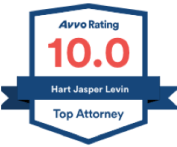Sealing Arrest Records
Sealing Arrest Records in California
If you’ve been arrested but not convicted, the arrest record can still affect your future opportunities. At The Law Offices of Hart J. Levin, we help individuals in Los Angeles and the Southern California area seal their arrest records, so they can move forward without the burden of a past mistake or misunderstanding.
Sealing an arrest record ensures that it’s no longer accessible by most employers, landlords, or the general public. Once sealed, the record is treated as though the arrest never happened, offering you a fresh start.
Why Seal An Arrest Record?
Even if your arrest didn’t lead to a conviction, it can still appear in background checks and cause significant issues. The benefits to sealing your record include:
– Employment Barriers: Many employers run background checks, and an arrest record can hurt your chances of landing a job, even if you were never convicted.
– Housing Issues: Landlords often review criminal records as part of the rental application process. An arrest, even without a conviction, could lead to your rental application being denied.
– Professional Licensing: Certain careers, such as teaching, nursing, or law, require state licenses. Licensing boards may deny applications based on an arrest record, affecting your ability to work in your chosen profession.
– Educational Opportunities: Colleges and universities may also consider criminal records during the admissions process, or for financial aid eligibility.
– Personal Reputation: Even beyond professional consequences, an arrest record can be damaging to your reputation in your community or social circle. It typically appears in an online search which can cause embarrassment.
Sealing your record protects your privacy and ensures that an arrest without conviction doesn’t unfairly limit your life choices.
Eligibility for Sealing an Arrest Record
Not everyone qualifies for sealing their arrest record under California law. To be eligible, one of the following must apply:
– You were arrested but never formally charged with a crime.
– The charges were dismissed or dropped.
– You were acquitted (found not guilty) at trial.
– The statute of limitations has expired, meaning the prosecution can no longer file charges.
– You successfully completed a diversion program in lieu of criminal prosecution.
California law is specific about who can apply to seal a record, and our legal team will review your case carefully to ensure you meet the necessary criteria. We work closely with clients to confirm their eligibility and develop a legal strategy tailored to their unique circumstances.
Instances When Sealed Records Can be Lawfully Used
Although sealing an arrest record provides significant protection, there are specific situations where the sealed record can still be accessed or required by law. These situations include:
– Applications for Public Office: If you run for public office, your sealed arrest record may still be disclosed.
– Law Enforcement or Licensing Agencies: Certain professional fields, like law enforcement, medical professions, and education, require background checks that may include sealed records.
– Immigration Proceedings: In some immigration cases, sealed records may be considered during background checks or visa applications.
– Federal Security Clearances: Some government positions requiring high-level security clearance may access sealed arrest records.
It’s important to be aware of these exceptions, though for most people, sealing their record eliminates nearly all practical consequences of the arrest.
Process for Sealing an Arrest Record
The process to seal an arrest record in California involves several steps, and it can take some time to complete. Here’s what to expect:
– Filing a Petition: The first step is filing a formal petition with the court, requesting that your arrest record be sealed. This petition must outline why you are eligible and why sealing the record is in the interests of justice.
– Serving Law Enforcement: All law enforcement agencies involved in the arrest must be notified of the petition and served a copy. These agencies have the right to contest the petition if they have concerns about the record being sealed.
– Court Hearing: A judge will review your petition and may hold a hearing to consider arguments for and against sealing your record. As your attorney, we will represent you in court, presenting evidence and making a case as to why your record should be sealed.
– Decision: If the court grants your petition, your arrest record will be sealed. Once sealed, it will be removed from public databases and background checks. It also gets sent to the Department of Justice.
This process requires careful attention to detail, as errors or omissions can result in delays or denials. At The Law Offices of Hart J. Levin, we handle each step of the process for you, ensuring everything is done correctly and efficiently.
What is The CARE Act?
The California Arrest Record Equity (CARE) Act was passed in 2017, making it easier for individuals with non-conviction arrests to have their records sealed. Under the CARE Act, if you were arrested but never convicted, the burden of proof shifts to the prosecutor to demonstrate why the record should not be sealed. This law provides broader protection for individuals who were wrongfully arrested or whose charges were dropped, and it streamlines the process for sealing arrest records.
We stay up-to-date on all changes in the law to ensure our clients benefit from the latest legal protections, including the CARE Act.
Difference Between Sealing a Record and Expungement
While sealing a record and expunging a conviction may sound similar, they serve different purposes and apply to different legal situations:
– Sealing a Record: This applies to arrests that did not result in a conviction. When a record is sealed, it is hidden from public view, as though the arrest never happened.
– Expungement: This is the process of removing a criminal conviction from your record after you’ve successfully completed probation or sentencing. Expungement applies to convictions, not arrests.
We can help you determine which option applies to your case and guide you through the appropriate process to clear your record.
How Long Does it Take to Seal a Record?
The timeline for sealing an arrest record can vary, depending on several factors:
– Court Schedules: How busy the court system is in your jurisdiction can affect how long it takes to get a hearing.
– Law Enforcement Response: If law enforcement contests your petition, it can extend the process.
Complexity of the Case: More complex cases, such as those involving multiple arrests or legal issues, may take longer to resolve.
On average, it can take anywhere from two to four months to complete the process from start to finish. Our team will keep you updated throughout and provide an estimated timeline based on your specific case.
At The Law Offices of Hart J. Levin, we are dedicated to helping our clients seal their arrest records and move forward without the stigma of a past arrest. With years of experience in criminal defense, we know how to navigate the system and fight for the best outcome for your case.
If you’re ready to seal your arrest record and protect your future, contact us today for a free consultation. We’re here to help you take the first step toward a fresh start.
- Tel: 310-986-2030
- Fax: 310-776-9020
- Email: hart@hartlevin.com
-
Law Offices of Hart J. Levin
355 S Grand Avenue #2450
Los Angeles, CA 90071 -
401 Wilshire, Blvd.,
12th Fl. Penthouse
Santa Monica, CA 90401








